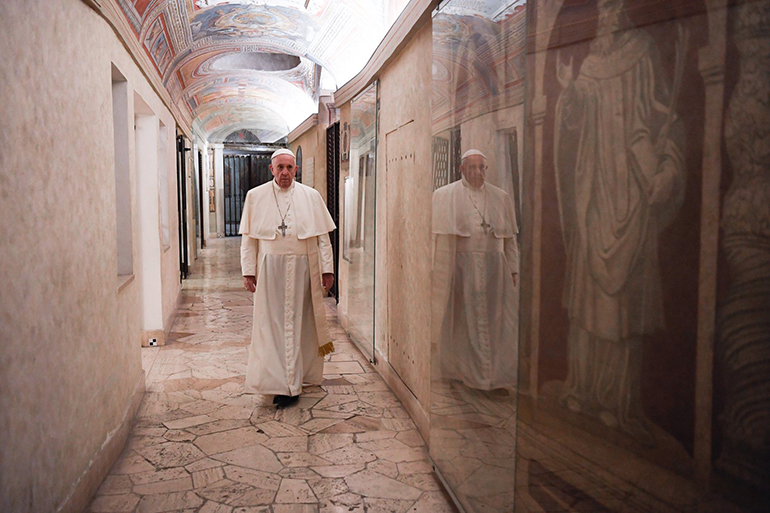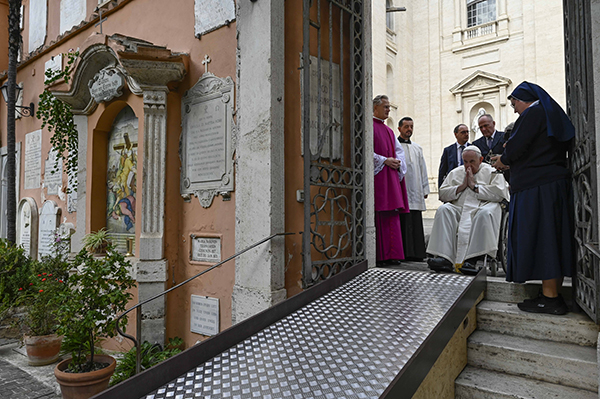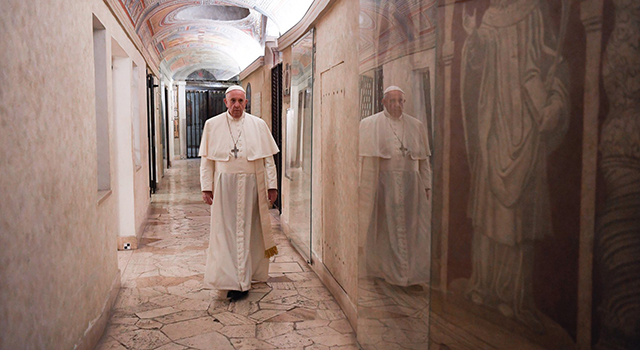By Catholic News Service - Catholic News Service

Photographer: Vatican Media
Pope Francis walks through the crypt of St. Peter's Basilica as he visits the tombs of deceased popes at the Vatican on All Souls' Day, Nov. 2, 2020. In a 2023 interview marking the 10th anniversary of his election, the 86-year-old pope insisted it is not his task to make an accounting of what he has or has not accomplished since March 13, 2013. "The Lord will do the appraisal when he sees fit."
By Cindy Wooden
OSVNews / Catholic News Service
VATICAN CITY | In interviews focused on the 10th anniversary of his election, Pope Francis insisted it is not his task to make an accounting of what he has or has not accomplished since March 13, 2013.
"The Lord will do the appraisal when he sees fit," the pope told the Italian newspaper Il Fatto Quotidiano.
However, he said he was certain the criteria for judgment would be from Matthew 25: feeding the hungry, welcoming the stranger, clothing the naked, caring for the sick and visiting prisoners.
But he did have three words for what he hopes for the future: "Fraternity, tears, smiles."
As Pope Francis marked his anniversary celebrating Mass with cardinals in the chapel of his residence, Vatican News released a short "popecast" that included the pope's three-word response to a question about his dreams for the Church, the world and humanity.
"We are all brothers and sisters," he explained, and more efforts must be made to live like it.
"And to learn not to be afraid to weep and to smile," he said. "When a person knows how to cry and how to smile, he or she has their feet on the ground and their gaze on the horizon of the future."
"If a person has forgotten how to cry, something is wrong," Pope Francis said. "And if that person has forgotten how to smile, it's even worse."
The 86-year-old pope also asked the Vatican News interviewer, "What's a podcast?"

Photographer: Vatican Media
Pope Francis prays at the entrance to the Vatican's Teutonic Cemetery, a medieval cemetery now reserved mainly for German-speaking priests and members of religious orders, during a visit Nov. 2, 2022, the feast of All Souls. In an interview for the 10th anniversary of his pontificate March 13, 2023, the 86-year-old pope said he thinks about death often, because it is a good thing to remember one will not live forever. (CNS photo/Vatican Media)
In the handful of interviews Pope Francis granted in connection with his anniversary, several topics kept coming up: the war in Ukraine and wars around the world, women in the Church, outreach to LGBTQ Catholics, handling criticism and even whether he thinks about death.
He does, he told the Argentinean website Perfil. He said he thinks about death often and "very peacefully" because "it is necessary to remember" that no one lives forever.
The Argentinean newspaper La Nacion asked Pope Francis about the importance of the Synod of Bishops on synodality, a process the pope launched in October 2021 and that will culminate with synodal assemblies in 2023 and 2024.
In the context of explaining how he has tried to revitalize the synods, which were reinstated by St. Paul VI after the Second Vatican Council, the pope told La Nacion that including more voices is an ongoing process.
During the 2019 Synod of Bishops for the Amazon, he said, "the question was asked: Why can't women vote? Are they second-class Christians?"
The Vatican's answer always had been that while the input of many was essential to a synod, it was the role of bishops to discern and vote. However, 10 priests -- and occasionally a religious brother -- traditionally were elected by the men's Union of Superiors General of religious orders as full voting members of the synod alongside bishops.
In February 2021, Pope Francis named Xavière Missionary Sister Nathalie Becquart one of the undersecretaries of the synod general secretariat, a post that would make her an automatic voting member of the assembly.
So, La Nacion asked the pope if only one woman would have a vote at the next synod assembly.
"Everyone who participates in the synod will vote. Those who are guests or observers will not vote," he said, but whoever participates in a synod as a member "has the right to vote. Whether male or female. Everyone, everyone. That word everyone for me is key."
On the question of LGBTQ Catholics, Pope Francis insisted to the Perfil interviewer that "everyone is a child of God and each one seeks and finds God by whatever path he or she can."
While the pope insisted matrimony can only be between one man and one woman, he also repeated his support for the legal rights guaranteed by civil unions for gay couples and others who share a life. And he said, as he told the Associated Press in January, homosexuality should not be criminalized.
As for Catholic teaching that homosexual acts are sinful, like any sexual activity outside of marriage, Pope Francis said he did not think those sins would send a person to hell.
"God only sets aside the proud, the rest of us sinners are all in line," he said, and God always is reaching out to save sinners who seek his help.
In the interviews with both La Nacion and Perfil, Pope Francis insisted there is a difference between a pastoral outreach to LGBTQ Catholics and accepting "gender ideology," which, he said, "is one of the most dangerous ideological colonizations."
"Why is it dangerous? Because it dilutes differences, and the richness of men and women and of all humanity is the tension of differences. It is to grow through the tension of differences," the pope said.
A gender theory that sees being male or female as a social construct or choice rather than a fact related to biological identity "is diluting the differences and making the world the same, all blunt, all equal," the pope said. "And that goes against the human vocation."
In each of the interviews, he spoke of the horror of war and his concern for the continued fighting in Ukraine.
Asked by Vatican News what he would want as a gift for his 10th anniversary, Pope Francis responded: "Peace. We need peace."

